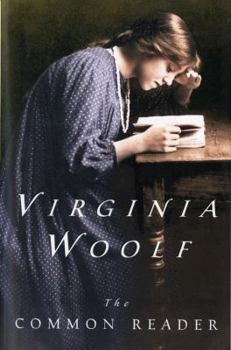The Common Reader
Select Format
Select Condition 
Book Overview
Woolf's first and most popular volume of essays. This collection has more than twenty-five selections, including such important statements as "Modern Fiction" and "The Modern Essay." Edited and with an Introduction by Andrew McNeillie; Index.
Format:Paperback
Language:English
ISBN:015602778X
ISBN13:9780156027786
Release Date:November 2002
Publisher:Houghton Mifflin
Length:288 Pages
Weight:0.65 lbs.
Dimensions:0.8" x 5.1" x 7.9"
Customer Reviews
2 ratings
An uncommon writer and the common reader
Published by Thriftbooks.com User , 17 years ago
In the opening essay in this book Woolf tells us she is writing for the common reader. The common reader is not the critic and not the scholar."He is worse educated, and nature has not gifted him so generously. He reads for his own pleasure rather than to impart knowledge or correct the opinions of others. Above all, he is guided by an instinct to create for himself, out of whatever odds and ends he can come by, some kind of whole- a portrait of a man, a sketch of an age, a theory of the art of writing." Woolf then goes on in the subsequent essays to write of Chaucer, Jane Austen, Joseph Conrad, Montaigne, George Eliot, Defoe, Addison, 'Modern Fiction' 'The Lives of the Obscure' ' Jane Eyre and Wuthering Heights' 'The Russian Point of View'. She writes with a special kind of insight and artfulness. I especially liked her essay on Montaigne who she sees as one of the few writers who truly makes a portrait of himself, and writes truly of the whole of his experience. She sees him as one who knew not only how to communicate himself but to be himself, who defied convention and ceremony, and prizing contemplation and retirement made a book which was himself. It can be said that Woolf in a way does the same with these reflections upon others which hold up a mirror to her own masterfully insightful sensibility.
Uncommonly Good Read
Published by Thriftbooks.com User , 24 years ago
You start out wanting to like this author. She has a witty, humorous way with words, a reverence for the written word and a telling grasp of what distinguishes writers of various eras. Of Elizabethan dramatists, she writes, "Theirs is the word coining genius, as if thought plunged into a sea of words and came up dripping." She writes about Classical Greek damatists as one who understands what separates them from all writers who follow: "To understand him," she says of Aeschylus, "is is necessary to take that dangerous leap through the air without the support of words ... for words, when opposed to such a blast of meaning, must give out, must be blown astray..." For her, the best writing, whether that of a Greek or an Englishman, has a meaning that defies words, a meaning that we percieve in the mind -- without words. Coming down the centuries and pausing to consider Jane Austen, she captures the essential writer in terms that encourage and enlarge: "Think away the surface animation, the likeness to life, and there remains, to provide a deeper pleasure, an exquisite discriminaiton of human values." Along with her interest in the well known (she treats many more than the few mentioned here)she has a teasing regard for near greats and nobodies, whose seldom touched books rest in near oblivion. Of the memoirs of one, Laetitia Pilkington, she writes: "... the dust lies heavy on her tomb ... nobody has read her since early in the last century when a reader ... left off in the middle and marked her place with a faded list of goods and groceries." Nor is it just to have a chuckle that she looks at such relative unknowns, but to give us a look at their pained and frequently bereft lives. Laetitia Pilkington was badly used by men in her life. Woolf has a compassion for such women. You begin by wanting to like this woman who claims it's the common reader who makes or breaks an author. As you read on, you find yourself happily taken in and smiling at her wit, humor and insight.






